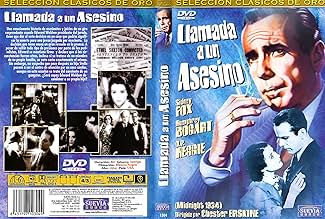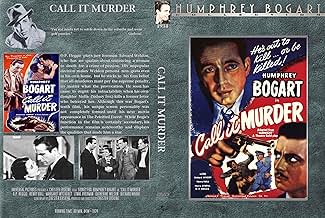Ajouter une intrigue dans votre langueThe foreman of a jury asks questions that send a woman to the electric chair for a murder committed in the heat of passion. On the night of the execution, his actions come back to haunt him.The foreman of a jury asks questions that send a woman to the electric chair for a murder committed in the heat of passion. On the night of the execution, his actions come back to haunt him.The foreman of a jury asks questions that send a woman to the electric chair for a murder committed in the heat of passion. On the night of the execution, his actions come back to haunt him.
- Joe Biggers
- (as Lynn Overman)
- Dist. Atty. Plunkett
- (as Moffat Johnson)
- Ingersoll
- (as Henry O'Neil)
- Jury Member
- (uncredited)
Histoire
Le saviez-vous
- AnecdotesBased on the flop play, Midnight (1930). Drama. Written by Claire Sifton and Paul Sifton. Directed by Philip Moeller. Guild Theatre: 29 Dec 1930- Feb 1931 (closing date unknown/48 performances). Cast: Maud Allan, Glenn Anders (as "Bob Nolan"), Harold Bolton, Zena Colaer, Josephine Hull (as "Mrs. Weldon"), William R. Kane, Jack La Rue (as "Gar Boni"), Tom H.A. Lewis, Harriet E. MacGibbon (as "Ada Biggers"), Clifford Odets (as "Arthur Weldon"), James Parker, Frederick Perry, Francis Pierlot (as "Richard McGrath"), Charles Powers, Samuel Rosen, Neal Stone, Robert Strange, Fred Sullivan, Royal Dana Tracey, Louis Veda (as "Photographer"), Harold Vermilyea (as "Joe Biggers"), Linda Watkins. Produced by The Theatre Guild.
- GaffesDuring Stella and Gar's first meeting in the court room, audible clicks can be heard between their line.
- Citations
[first lines]
Ethel Saxon: You see, I loved him. I mean I loved him when... when he didn't love me anymore, day in and day out watching him get further and further away from me. I could see in his eyes when he looked at me... I could see he hated me, hated me because I needed him. Oh, I was so frightened, so mixed up. It's so horrible to see someone who's become part of you slipping away, slowly. To feel helpless and empty, lonely and frantic, wanting to do something, anything, anything to bring him back! To patch things up, to try to tie together the few remaining bits of happiness... and then, that awful day when he drew the money from the bank and I knew the end I'd been waiting for had come, that all my fears were realized, that he was going away. I went mad... he mustn't go away, he mustn't go! Anything to stop him, anything! That's all I wanted to do
[starts to weep]
Ethel Saxon: I didn't mean to kill him, I only meant to stop him, to stop him from going away.
- Autres versionsIn the retitled version, "Call it Murder" Humphrey Bogart's billing is moved to above the title.
- ConnexionsFeatured in Mind Games (1989)
After 15 minutes I decided that this was the worst film I've ever seen but I stuck with it and then decided that it was brilliant!
Can't say I know much about Chester Erskine but this was his first film. After graduating from film school he obviously had dozens of ideas he was itching to incorporate into his first work of art. Given free reign to do whatever he liked, that's exactly what he did and you can taste his enthusiasm. Some of his innovations don't work but nevertheless it's fascinating to watch. There's one scene for example where the troubled Mr Weldon is doing a monologue with the camera zooming in on him - it zooms in so fast that you can see the poor old guy staggering back to avoid being hit in the face with the camera! In style and structure this film reminded me a little of HEAD, that experimentally weirdly incoherent film The Monkees made in the late sixties.
Whilst this is essentially a filmed stage play, Erskine's imaginative and innovative tricks and techniques really make this into a genuine movie. Visually it's stunning, so different from the typical directorial styles seen in Hollywood in the early thirties. Here in England we had Hitchcock making innovative (and good) films, in France Jean Cocteau and Bunel were creating their avant-garde masterpieces. These filmmakers clearly influenced Erskine but in comparison, his own effort looks very childish but at least he tried. He tries to do something different and that's what makes this a worthwhile watch.
The story is essentially about how Mr Weldon, who was on a jury, copes with being responsible for a murderer going to the electric chair and how this affects his daughter. It's a ridiculous story but Erskine's novel take on how to make a movie makes this inexplicably engrossing. What's clever is how Erskine makes you, the viewer part of the jury. With some interesting use of mirrors, you're in the centre of all this - you're the one who has to decide what's the right thing to do - you're the one to decide whether the death sentence is justified - you're the one who has to decide on the subsequent guilt of the daughter. In some respects, it's superb filmmaking.
The question is therefore why isn't Chester Erskine more well-known? Why isn't MIDNIGHT a classic? Why didn't it walk away with all the Oscars that year? The answer is simple - the acting is truly terrible: really, really truly terrible! This bad acting is however intrinsic to the overall style of the film but its strangely slow and incredibly unnatural pace makes this weird. Some people will find this unwatchable, some people will find it brilliant. If you like pseudo intellectual, cod-psychological pretentiousness, you'll enjoy this - it even ends with a pretentious 'finis' - love it!
- 1930s_Time_Machine
- 1 févr. 2023
- Lien permanent
Meilleurs choix
- How long is Midnight?Propulsé par Alexa
Détails
- Date de sortie
- Pays d’origine
- Langues
- Aussi connu sous le nom de
- Call It Murder
- Lieux de tournage
- sociétés de production
- Consultez plus de crédits d'entreprise sur IMDbPro
Box-office
- Budget
- 1 000 000 $ US (estimation)
- Durée1 heure 16 minutes
- Couleur
- Rapport de forme
- 1.37 : 1
Contribuer à cette page



















